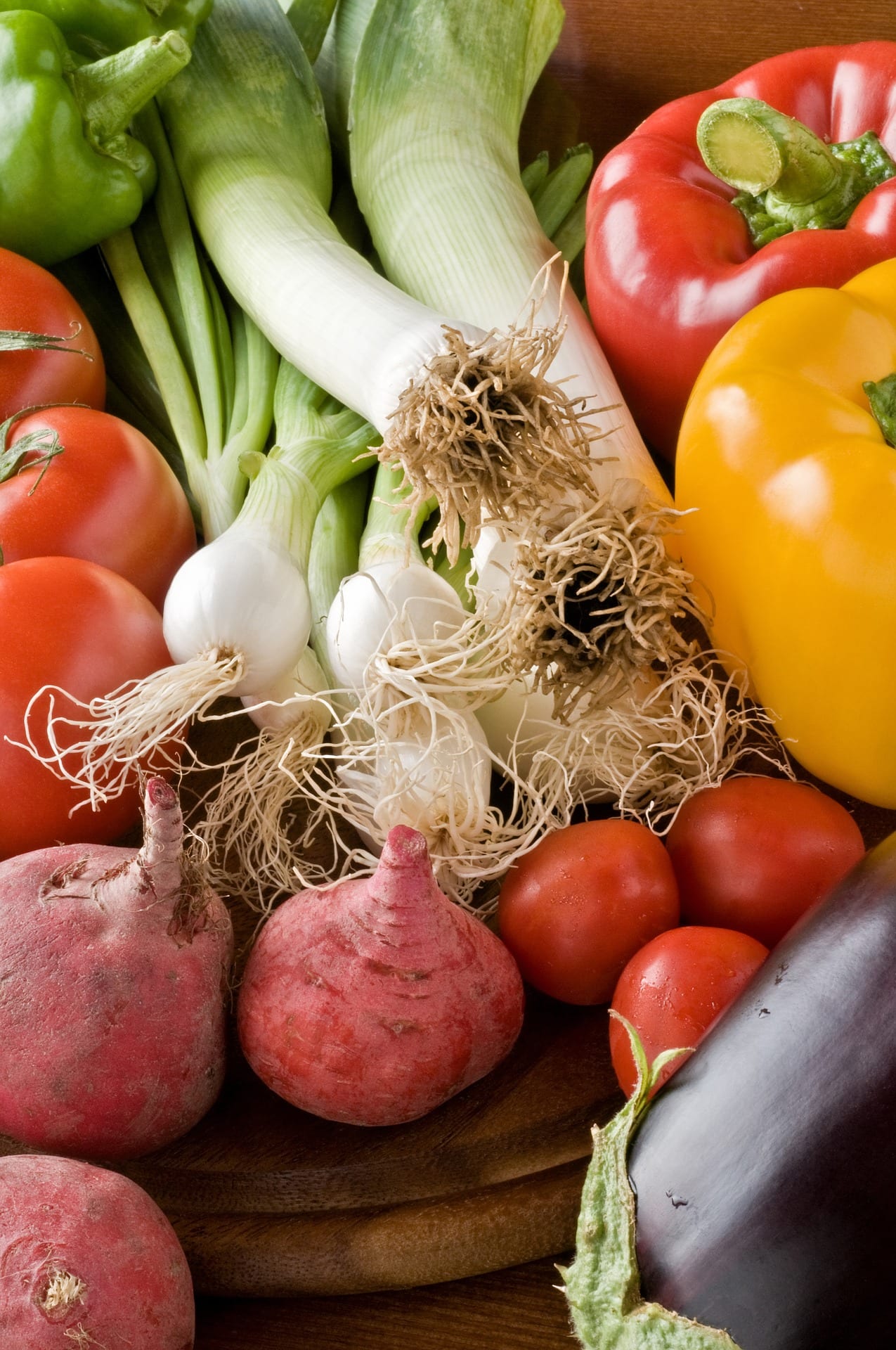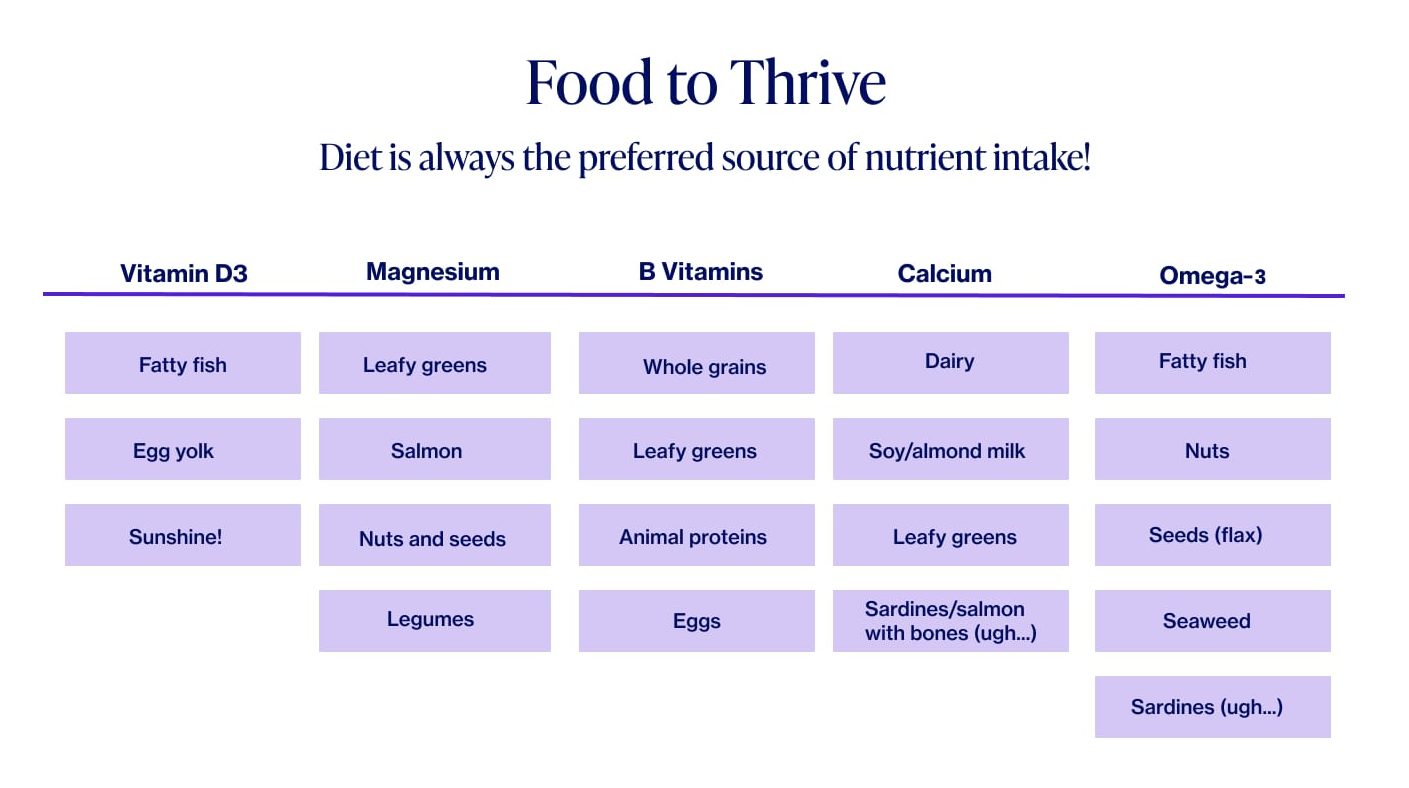
Published on Feb 19, 2021
Last modified on Nov 20, 2023
Elektra Guide to Nutrition During the Menopause Transition
5 min read
When it comes to optimal health during perimenopause and menopause, nutrition is one of the most powerful tools each and every one of us has the ability to control.
More often than not, it comes up in discussions around weight gain — and for good reason. But here at Elektra, we prefer to reframe the conversation by thinking of diet and nutrition as the fuel which allows us to live well today and into the future. This holistic take is profoundly important for something as complex and impactful as nutrition which, yes, affects weight, but also plays a role in everything from gut health to heart, brain, and bone health.
Does what you eat really make a difference during menopause?
100%. Here’s why: Diet impacts biological processes, which is a souped-up way to say it affects how our bodies function. One of these functions is the production and metabolism of estrogen which, as we know, plays a leading role in menopause.
Traditionally, nutrition science is actually difficult to conduct, for multiple reasons. First, the effect of nutrition is complex and may depend on genetic, hormonal, and environmental factors (such as how much we sleep). Also, many studies rely heavily on food diaries. At the end of the day, how accurately are people reporting what they eat? And what if a participant forgot to write it down at the time? We don’t know about you, but we can’t remember what we had for lunch yesterday, not to mention last Tuesday

Pro tip #1
Looking for a healthy dish to spice up your weeknight dinners? Look no further than Minimalist Baker. Her flavorful, interesting recipes can be sorted by different variables, such as refined sugar- or dairy-free. And the best part? They all come together with 10 ingredients MAX, in 30 minutes or less, or in one pot. We love Cauliflower Rice Stuffed Peppers and this Miso-Glazed Salmon & Veggie Sheet Pan Dinner, which are guaranteed to get you out of your recipe rut.
Studies on the impact of nutrition on menopausal women are few in number, but they’re out there and deserve our attention. In fact, a recent study conducted by The North American Menopause Society (NAMS) found that inflammatory diets (i.e. diets that skew heavy on sugar, trans fats, refined carbs, processed meat, and alcohol) are associated with more severe menopausal symptoms — although the scientific community doesn’t (yet) fully understand why.
Inflammation
Inflammation seems to be one of those wellness words that’s tossed around all the time, so if you need a quick refresh on what it is, you’re not alone. As part of our body’s normal response to infection or injury, inflammation causes damaged tissues to release chemicals that signal to white blood cells that it’s time to start repairing — which is totally a good thing and exactly what we want to happen when there’s an injury.
What we DON’T want, however, is for the inflammation to become chronic and spread throughout the body, because then it can actually cause damage and increase your risk of heart disease, stroke, cancers, diabetes, and more.
Unfortunately, the natural and normal hormonal change of menopause — particularly lower estrogen levels — combined with the process of aging itself, result in alterations in the metabolism of lipids (types of cholesterol). Downstream effects include increased fat mass, decreased muscle mass, and the creation of inflammatory signals called cytokines. And increasing fat in the abdomen (aka “central fat”) and around the organs (aka “visceral fat”) ESPECIALLY leads to higher levels of inflammation.
We know, it’s a LOT.
That’s why we need to make an impact where we can. When we eat foods such as processed sugar, the body releases chemical messengers that raise the risk of chronic inflammation, which can manifest as feelings of fatigue, crankiness, etc. And while there are many reasons for symptoms like these, food is a BIG one.
What should I eat?
You’ll probably hear us say this a zillion times, but there’s no one-size-fits-all diet. And for good reason, since every woman has unique needs, goals, and biochemistry.
That being said, there are certain tried-and-true nutrition tenets that our team of doctors recommends to keep inflammation at bay and help us live well through the menopausal transition (and beyond).
- Plants are good! Especially leafy greens and other deeply colored vegetables. The more, the better.
- Eat the rainbow. The bright colors found in fruits and vegetables represent different phytonutrients such as antioxidants that the body needs.
- When in doubt, stick to whole foods, or foods that are unprocessed and unrefined, or as unprocessed or unrefined as possible. Take a look at the label – if your grandmother wouldn’t recognize the ingredients, then skip it.
- Keep an eye out for those that seem whole but actually aren’t (we’re lookin’ at you, store-bought salad dressings, “nutrition” bars, and anything low-fat/fat-free). A good rule of thumb: do most of your shopping in the perimeter of the grocery store and avoid shopping in the inner aisles where the packaged (aka processed) food lives.
- Skip added sugars, whenever possible.
- Fill up on fiber, which works wonders to keep things moving & grooving. This is so important since regular bowel movements help the body detox from excess estrogen. And if that wasn’t enough, fiber also plays a role in lowering markers of cardiovascular disease. It has a beneficial effect on lipid metabolism and slows down sugar absorption (fun fact: that’s actually why it’s much better to eat whole fruit than drink fruit juice)! Yes, a nutrient of many hats.
- Swap out a cocktail for a mocktail. There are some great new zero proof spirits and cocktails and the Elektra team did a taste test. We love Ghia’s aperitif and alcohol-free tequila from Ritual.
- Not all fat is made equal. Stick to healthy omega-3 fatty acids from foods like nuts, avocados, and fatty fish. When it comes to saturated fats, be mindful and selective about the source (butter and meat on occasion!). And avoid foods like processed snacks, fried foods, and margarine, which are loaded with trans fats.
- Hydrate, hydrate, hydrate! You want your urine to be pale and clear and you don’t want to feel thirsty very often. It’s helpful for everything inside (your brain – yes, really) and out (your skin).
Michael Pollan, author of The Omnivore’s Dilemma, summed it up best when he said: “Eat food. Not too much. Mostly plants.”
The reason this is SOOOO important? Proper nutrition can have a marked effect on a variety of key menopause symptoms, including hot flashes, sleep disturbances, acne, anxiety, mood changes, bloating, fatigue, and weight gain.
What’s the best menopause diet?
Trick question, folks! Because as we mentioned above, there isn’t one perfect diet for all of us.
That being said, the Mediterranean diet has rightly earned a lot of hype for its positive effects on everything from mental health to weight loss. It’s lower in saturated fats and animal protein and higher in plant-filled goodness compared to the standard American diet. It’s also a good source of antioxidants and fiber, anti-inflammatory, low-carb, and low-sugar.
And because it kicks most refined and concentrated sugars to the curb and focuses instead on non-starchy veggies, beans, fruit, and whole grains, it’s considered a “low-glycemic” diet — meaning it won’t dramatically spike our blood sugar.

Here’s a quick primer on what is and isn’t included:
Included: vegetables, fruits, nuts & seeds, legumes, whole grains, potatoes, herbs & spices, fish & seafood, extra virgin olive oil
Partially included (but in moderation): poultry, eggs, dairy products (cheese & yogurt)
Not included: added sugars, sugar-sweetened beverages, processed meats, refined grains, refined oils & other processed foods
Elektra experts also recommend proactively adding specific foods into your diet that address specific symptoms:
For hot flashes & night sweats: soy, flaxseed, legumes (and no, moderate amounts of soy alone don’t put us at an increased risk of breast cancer and it’s safe for breast cancer survivors to eat! If you’re curious, check out our article on the various effects of soy on the human body).
For brain fog: dark leafy greens, berries, raw cacao, caviar, extra virgin olive oil/flaxseed oil
For bloating: ginger
For mood and anxiety: omega-3 fatty acids (fatty fish, olive oil, avocado)
But what about all of the other diets, specifically related to weight and weight loss?
Here’s our science-based take on a few of the the various diets and weight loss theories out there:
Keto
This “diet” relies on eating mostly fat (at least 55-60%) and fewer carbs (<10 grams), which means lots of olive oil, fatty fish, avocados, and nuts. While those are certainly all healthy, beneficial foods, keto can skew heavily towards animal proteins, including meat, cream/dairy, and processed fats which, long-term, aren’t great for us. So while the diet can be very effective for initial weight loss — as well as energy and clarity — it’s difficult to sustain, and most of us who do keep it up aren’t eating sufficient fiber and plant-based foods.
If you consider keto, go for the version that includes lots of vegetables to make sure you’re getting enough fiber, and limit processed meats. Also, for many, dairy can cause issues so if you’re feeling bloated or gassy, skip the dairy and see if it improves.
Low-Carb
Low-carb can be effective for weight loss. There’s no hard and fast definition of a low-carb diet, and usually this involves limiting daily carbohydrate intake to around 50-150 grams. And the carbs you’re eating are mainly from vegetables, and most pasta, breads, etc. are avoided. This has been shown to be effective for weight loss, and it actually helps to decrease appetite (also good for weight loss!).
Low-carb has other health benefits as well, including lowering blood sugar, blood pressure, and triglycerides, which are a type of fat found in your blood, that, if levels are too high, can contribute to the hardening of your arteries.
“Calories in” vs “calories out” theory
Generally speaking, it is true that if we consume a much higher amount of calories than we expend, that energy surplus will be stored in our bodies as fat. But that is not the whole story (we repeat: NOT the whole story). It’s just as important to pay attention to where those calories come from, their nutrient content, and the way a particular food influences our blood sugar and hormones such as insulin.
In other words, our bodies don’t process 100 calories from an apple like they do 100 calories from a chocolate chip cookie.
Intermittent fasting
Elektra’s founding physician, Dr. Anna Barbieri, MD, likes intermittent fasting (aka IF, or “time restricted eating”) for its numerous benefits — namely sugar control and weight loss — however, some see more benefits from it than others (yet another reason why diet isn’t one-size-fits-all).
In order to see results, a 16:8 schedule is recommended, which means 16 hours of consecutive fasting during a 24-hour period. Fasting hours include sleeping hours, so many find this to be a doable schedule (for example, eat between the hours of 12P – 8P, and fast overnight until noon the next day). During the fast, you can have things that don’t raise insulin at all, like liquids. It can help to start with a 12:12 schedule, when you fast for 12 hours, and work your way up to 16:8.
There are other IF regimens as well, like alternate-day fasting and a 5:2 fast, where you limit intake to 500 calories or fewer every other day, or two days of the week. Regimens that involve fasting for more than 1 day per week should be done under the supervision of a physician or registered dietitian.
Think of IF as less like a “diet” per se, and more like an eating pattern which, when done correctly, can lead to numerous health benefits, including shedding weight, reducing inflammation, supporting heart and brain health, etc. For weight management, IF is probably the easiest intervention and is even more powerful when combined with what we eat (plant-heavy, no added sugars) and how we eat (portion control).

Pro tip #2
Diet is about so much more than weight. Case in point: it has an impact on your brain health. The best diet for brain health is low carb/high healthy fat and lots of water.
Dehydration can cause brain shrinkage (yes, really!), and other neurological symptoms, so drink up! How much water we need can vary based on a whole slew of factors, but a safe bet is to drink enough so urine is pale and clear, and you don’t feel thirsty.
To summarize, there’s no one perfect menopause diet. But, Dr. Barbieri recommends you choose WHOLE unprocessed food, mostly plants, no added sugars, healthy fats, and lots of green stuff.
“I’ve seen women transform their menopause experience for the better by changing their diet. It takes work, but the payoff is big.”— Dr. Anna Barbieri, MD
Okay, so I want to change my diet. Where do I start?
First things first, start by taking stock of what you’re eating now. To do this, keep a food diary for around three days (here’s a great one from Harvard Health). Track what you eat, in addition to when, where, and with whom you’re eating. It’s also important to note how you feel after you’re finished. Are you eating when you’re bored or stressed? Do you have a post-dinner witching hour? By doing this, you can better assess recurring patterns and opportunities for change. Here’s a comprehensive guide to get you started.
Many of us know what works for us as far as weight loss and weight management; it’s the implementation that’s the hard part. And with the following tips and tricks, we can set ourselves up for success when making — and sticking — to the changes.
Control what’s in the house
Don’t want to eat it? Don’t buy it. And if family members or housemates do, give them their own section (or drawer, or cabinet, somewhere NOT in plain sight) in the kitchen.
Avoid extreme diets
Unless you’re giving yourself a couple weeks to get started or are interested in trying a very potent anti-inflammatory diet program such as the Whole30, avoid extreme eating plans. They usually aren’t sustainable, and making changes we can maintain for a long time is far more valuable than sticking to an extreme pattern for a week!
Establish a nutrition “support system”
A network of like-minded friends can be a powerful motivator when it comes to emotional support, practical accountability, or inspiration. We love the Facebook group Make Everyday Mediterranean Club moderated by Oldways, a nonprofit dedicated to educating people and organizations about healthy, sustainable “old ways” of eating.
Remind yourself that one meal won’t “make it or break it”
Use the 80/20 or 90/10 rule – eat clean for 80% or 90% of the time and if you indulge in a piece of cake once in a while, then so be it. It’s OK! Allow yourself that 10-20% of leeway, but commit to healthy eating for the rest. Balance this with being kind to yourself if you get off track — we’re only human!
Try a structured program like WW (formerly Weight Watchers) or Noom
Both are app-based programs that take a holistic view of wellness — nutrition, physical activity, and behavior included.
Remember that nutrition is about so much more than weight loss
Of course we, like mostly everyone, want to fit comfortably into our favorite jeans. But we have to bear in mind the importance of sustaining a healthy diet for the long haul. Nutrition impacts everything from gut health to heart, brain, and bone health. Plus, food plays a role in our traditions and connections with others, which also deserves to be honored.
Consult a professional
Since food plays a huge role in weight loss, meeting with a Registered Dietitian (RD) can be helpful in developing a plan. RDs are licensed professionals who earn a bachelor’s degree and pass a board certification exam. Nutritionists, on the other hand, can have a wide range of education and training but may not need certification and licensure depending on the state. Before you see someone, be sure to check their credentials.

Pro tip #3
When it comes to diet changes, set yourself up for success by starting small:
- Swap out soda (yes, even diet!) for flavored seltzer
- Add in protein-rich foods for breakfast
- Drink more water
- Eat slowly by putting your fork/spoon down between bites
- Use a smaller plate for meals to regulate portion size
What about supplements? Should I be taking any?
Outside of diet changes, there are also certain integrative options, including supplementation, that can help with general health and ease symptoms that come up during perimenopause and menopause. While it’s best to get our vitamins and minerals from food sources (see list below), some supplements may be recommended for general health if we need a bit of a boost.
RELATED: Elektra Guide To Supplements For Menopause
It’s always best to consult with your healthcare provider, or an Elektra provider, for medical advice before taking supplements. For more information on supplements, including how to go about selecting high-quality supplements, check out this quick primer from our team.
 Magnesium
Magnesium
Most Americans don’t get enough of this mineral (which is found in leafy greens, salmon, nuts, seeds, and legumes). Some opt for magnesium supplements to help with sleep, muscle cramps, constipation, and even anxiety. Magnesium also plays a role in bone health.
Vitamins B & D
B vitamins play a role all over the body. B6, for example, works by preventing or mitigating symptoms caused by low serotonin, specifically loss of energy and depression, while Vitamin D (the sun vitamin) promotes, among other things, immune health and bone health — we need Vitamin D to absorb calcium, which can help prevent osteoporosis.
Omega-3
Omega-3 fatty acids are important for many aspects of cardiovascular health, and may help with high blood pressure and cholesterol levels.
Calcium
Calcium is needed for bone health, which is especially important for women to prevent a loss in bone density. Women should get about 1,000 – 1,200 mg daily, preferably from food sources. Here’s a great list of foods high in calcium.
RELATED: Calcium During Menopause: How Much Do We Really Need?
Disclaimer: This information is for general educational purposes, and should not be used as a substitute for medical advice, diagnosis, or treatment of any health condition or problem.
As with anything you put into your body, taking dietary supplements can also involve health risks. You should consult a medical professional before taking supplements and inform your doctor about any supplements, as well as any medications you already take, since there may be interactions.
References
McCabe, D., Lisy, K., Lockwood, C., Colbeck, M. (2017, February). The impact of essential fatty acid, B vitamins, vitamin C, magnesium and zinc supplementation on stress levels in women: a systematic review. JBI Database of Systematic Reviews and Implementation Reports.
Kim, I. (2021, June 30). Current Perspectives on the Beneficial Effects of Soybean Isoflavones and Their Metabolites for Humans. Antioxidants (Basel).
Kresser, C. (2019, October 10). The Fundamental Problem with Most Nutrition Research. Kresser Institute
Aslani, Z., Abshirini, M., Heidari-Beni, M., Siassi, F., Qorbani, M., Shivappa, N., Hébert, J. R., Soleymani, M., & Sotoudeh, G. (2020). Dietary inflammatory index and dietary energy density are associated with menopausal symptoms in postmenopausal women. Menopause, 27(5), 568–578.
How to use food to help your body fight inflammation. (2019, August 13). Mayo Clinic.
Silva, T. R., Martins, C. C., Ferreira, L. L., & Spritzer, P. M. (2019). Mediterranean diet is associated with bone mineral density and muscle mass in postmenopausal women. Climacteric, 22(2), 162–168.
Gunnars, K. B. (2018, July 24). Mediterranean Diet 101: A Meal Plan and Beginner’s Guide. Healthline.
Diet Review: Ketogenic Diet for Weight Loss. (2019b, May 22). The Nutrition Source. Link.
Johnstone, A. (2014). Fasting for weight loss: an effective strategy or latest dieting trend? International Journal of Obesity, 39(5), 727–733.
Johnson, J. B., Summer, W., Cutler, R. G., Martin, B., Hyun, D.-H., Dixit, V. D., Pearson, M., Nassar, M., Tellejohan, R., Maudsley, S., Carlson, O., John, S., Laub, D. R., & Mattson, M. P. (2007). Alternate day calorie restriction improves clinical findings and reduces markers of oxidative stress and inflammation in overweight adults with moderate asthma. Free Radical Biology and Medicine, 42(5), 665–674.
Varady, K. A., Bhutani, S., Church, E. C., & Klempel, M. C. (2009). Short-term modified alternate-day fasting: a novel dietary strategy for weight loss and cardioprotection in obese adults. The American Journal of Clinical Nutrition, 90(5), 1138–1143.
Mattson, M. P. (2005). ENERGY INTAKE, MEAL FREQUENCY, AND HEALTH: A Neurobiological Perspective. Annual Review of Nutrition, 25(1), 237–260.



